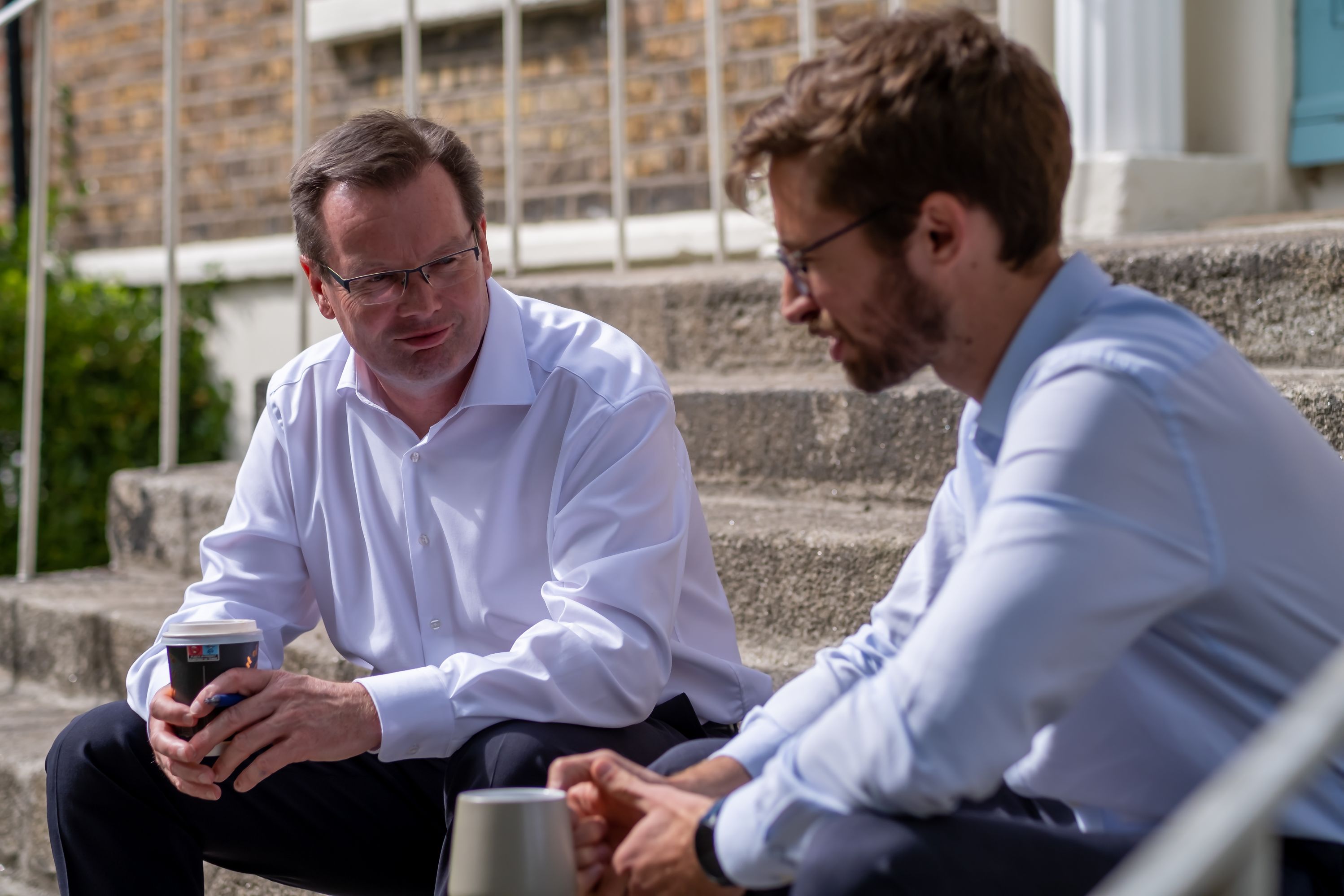
John Hughes, Director at Rogerson Reddan
What does your website say about your business, and who is it saying that to? Like many companies over the past few years, we decided to update our website and my colleagues and I had to grapple with those same questions.
We came to a surprising conclusion: we realised that our old website had ignored one vital area. As a result, it wasn’t speaking to a large proportion of our potential audience.
As a sales tool, our website plays a relatively minor role; we are a professional services business, so we mostly win new contracts through referrals, repeat business, or competitive tenders.
But as a recruitment tool, on the other hand, our website was hugely important. Outside of the interview process, it’s a vital opportunity to give potential recruits a feel for what we are about.
The lesson we learned was that our website’s content needed to focus much more on what our firm offers to current and potential staff members. That’s particularly important in a highly competitive market like the one we’re in now.
New graduates and ambitious professionals have their choice of where to work. If we want to hire and retain smart, motivated people, our website needs to make it clear that we offer a place where their talent can flourish; where it will be developed and encouraged.
Our intention was that the website content should reflect what the business really stands for and lives by – and these values should speak to potential employees.
Formalised graduate programmes or continuous professional development all have a place in the process, but they only truly succeed when the organisation’s philosophy genuinely supports and encourages talent development.
In other words, it comes back to mission, values, and culture. I have been reflecting on the question of talent development a lot lately, having attended a presentation by Professor Miquel Llado from IESE Business School in Barcelona as part of the Advanced Leadership Programme run by the Timoney Leadership Institute.
A lot of what I read in the case study and Professor Llado’s content resonated strongly for what we do in professional services firms – particularly in what we need to do to develop talent. Professor Llado’s session was based around a very interesting case study about La Masia, the FC Barcelona youth academy. La Masia identifies young footballing talent and develops the players to play in a consistent club style. This way, when players graduate to the senior teams, they are ready for the responsibility because they’ve been schooled that way.

La Masia, the famous FC Barcelona Youth Academy
Professor Llado (who admits he is a big Barca fan) used lots of footballing analogies to make his points, and they have the benefit of simplicity and relatability for most of us. One concept he used in several ways was passing the ball. For example, leaders need to be ready and willing to pass the ball to new or less experienced people, because they can only develop and grow with the ball at their feet. Similarly, the younger and less experienced team members need to “love the ball”, “ask for the ball”, and in particular make space for the leaders to pass the ball to them. Prof. Llado made the point that being “busy” is not a virtue, but being available is.
New team members must be ready and willing to accept the challenge. The football analogy for this is that sometimes players will have to receive the ball in pressure situations. In many working environments, people will default to doing what’s expected of them, and no more. That makes it all the more important to identify team members who are proactive and who show a willingness to ask for the ball, in Prof Llado’s terms.
Recently a graduate at the company asked to get involved in a support role in a specialist consultancy area that we were developing. They ran with the ball, establishing great relationships with clients, gaining specialist qualifications in the area. Now they generate new business for the firm in this area.
In another example, a new recruit had shown an aptitude for tweaking the specialist software that we use to deliver a big part of our cost management services. He was given the freedom to develop our templates, interfaces and protocols for how we use the software; now he’s the firm’s go-to person for the tool and the templates he developed will increase our efficiency and the quality of our output.
It reminded me that, as leaders or senior professionals, we need to constantly create the environment that allows situations like these to emerge as much as possible.
For leaders, Professor Llado argued that once they have passed the ball, they need to “stay off the pitch” and shine through the team. How many times have we seen a leader step in and complete a task because “it will take too long to explain”, or “it will be faster this way”?
Leaders who try to do the work for the team are “cheating” them when they should be developing them, in Prof Llado’s eyes. I found that a hugely important concept that we would do well to remember at all levels in organisations.
A phrase he used to reinforce this point was “wind extinguishes a candle but energises a fire”. If we apply that to the ball passing analogy, the new or younger player needs to be brave enough to seek the ball and the leader needs to be brave enough to pass it – but before exposing the player to the “wind”, both parties need to make sure that the fire is burning strongly enough to ensure it is energised by the challenge and is not extinguished.
I love the simplicity of Prof Llado’s image as a metaphor for leadership in all its forms. There’s a phrase in football called the hospital pass, where a player quickly moves the ball in a teammate’s direction to get out of a difficult situation, but the pass is poorly timed or inaccurate so it puts their teammate at risk of getting injured in a tackle.
In a business context, that might be where a manager delegates a tricky project or a difficult customer to a colleague. They might argue that they’re supporting that person’s growth, but I would disagree: they need to check themselves if they are really just pushing away some challenging work to avoid responsibility – or blame. Organisations and leaders need to ensure that this distorted version of the pass the ball culture does not accidentally develop.

John and Henno take time for a coffee and a chat
Careful training, mentoring, feedback and support is critical to talent development. Like La Masia, professional services firms need to find the right balance between development or coaching on the one hand, and exposing ‘players’ to the real world of delivery of client services on the other.
These can and should be complimentary, if the timing and circumstances are right, but it is the leader’s responsibility to manage the circumstances and opportunities to allow the team members to grow in ability and confidence. These are all useful concepts for all leaders to think about when developing teams and nurturing talent.
Coming back to developing the content for our firm’s website, I felt confident that we could back up our promises about talent. Because I knew it from personal experience.
I was incredibly fortunate in having managers who did spend that time and effort in developing talent. When I joined Rogerson Reddan in 1996, I found the attitude and approach of the founders Seamus Reddan and Fred Rogerson was way ahead of its time. They gave me, a relatively raw recruit, as much responsibility as I dared to seek and I was trusted to deliver.
For example, in my mid-20s I had been in the job for about two years when the company secured what was at the time its biggest project ever. I was tasked with looking after the cost management service of this contract which involved completely rethinking how we managed construction procurement and being much more proactive in the way we approached contracts.
It was both daunting and empowering, with a steep learning curve and requiring me to relocate for a year, but it was a satisfying experience that improved my own self confidence. I was always allowed and encouraged to push the boundaries of my own ability and experience.
Every day was an example of this philosophy: if you were good enough, you were old enough. No- one was held back because of their youth or inexperience. And at the same time, the support was always there from the senior team if we needed it; a vital safety net.
In parallel, the company encouraged further education and professional development, and as such this allowed me to develop additional expertise and qualifications as I progressed.
Now, our new website content reflects our culture of developing talent: “Once we find people with life and career missions that align with that of the company, through training and mentoring, we will work hard to help them find their voice and expertise to help them build their reputation and careers.”
Professional services may not be quite as brutal as professional football, so the comparison might not be direct, but if professional services firms don’t invest time, money and most importantly, trust, in developing their teams, then they are compromising and limiting their firms’ futures.
So at whatever level we are as individuals, we need to make space to receive the ball, and, when the time is right, to pass it to others. Business, after all, is a team sport.
John Hughes - Director, Rogerson Reddan
